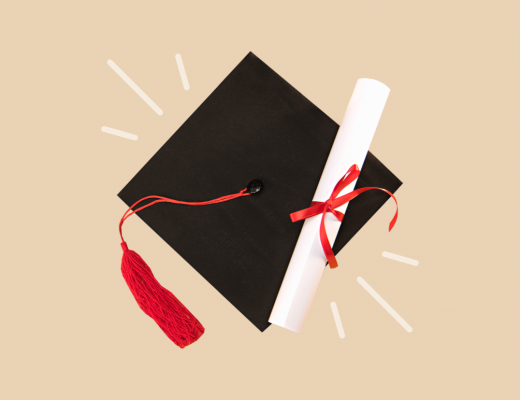In today’s society, you need a college degree to get your foot in the door. But college tuition keeps skyrocketing and with many students not being able to afford college, they take out student loans. Student loans are considered an investment for the future. Because people who have a bachelor’s degree make more money than people who only have a high school diploma. So although students take out loans to finance their education, the return on their investment could be much greater in the long run with the increase in salary.
At least, that is how the thinking goes. If student behavior actually followed that kind of model of thinking, then they would actively check their student loan balance once or twice a year. Students would also actively look online to research their estimated future earnings based on their major and on their desired occupation. Using these pieces of information, students can decide whether it’s a good idea to continue their enrollment in college. If they find that their student loan balance is too high compared to their estimated future earnings, then it would be a wise decision to drop out.
An interesting and unique thing about student loans is that the payments are not required to start until 6 months after graduation or after dropping out. The main benefit is students can be fully focused on their studies and schoolwork while they are enrolled as full-time students. But a huge drawback is that the consequences are delayed until after graduation (typically four years), so the fact that they owe money isn’t urgent. Because required payments begin so far off in the future, it tends to be pushed to the back of the mind and forgotten. And then after graduating, people finally grasp the reality of how much money they owe and regret borrowing so much money.
Sophia Sutcliffe, a Bard graduate that I met working at Kingsborough Community College, wrote her thesis on student loans and this kind of predicament. She conducted two studies. In the first study, Sophia studied how much students currently in college knew about their student loans and estimated future earnings. If students actually used student loans as an investment for their future, then they should be able to report how much they currently owe, how much they expect to owe upon graduation, their student loan interest rate, and an estimate of how much the expect to make in the future.
Sophia also did a second study on the way student loans were presented and packaged (information displayed in a table vs. as a list). She tested how the presentation affected students understanding of their student loan commitment. I am going to focus on the first study in this blog post. You can read her entire thesis by downloading it here.
Both studies were conducted at Bard College, a private liberal arts school in upstate New York. After removing unqualified survey participants for various reasons, a total sample of 147 students were surveyed on their attitudes to debt and how much they knew about their student loan commitments.
Participants were asked to report how much they currently owed, the type of loan they held (federal subsidized, unsubsidized, federal Perkins loans, and private loans), the interest rate for each type of loan, whether they check their loan balance once a year, and whether they made a loan payment.
The results showed that 51.4% of students did not know their current loan balance within a range of $1,000, and 45.9% of students did check their balance once a year. Some students expressed “that at one point they knew but that the numbers had ‘jumbled together.'” Sophia also found that 25.2% of students did not know how much debt they were expected to graduate with within a range of $5,000 – $10,000. Interestingly, 25% of students already started making payments on their student loans, which shows active debt management behavior, but it is also possible that the payments were for private student loans in which the repayment period already began.
As for the estimated future earnings, first year students were much more confident in their salary estimates than fourth year students. Fourth year students provided an average estimate of $50,800, while first year students gave an average estimate of $60,790. Students in their first year didn’t research their potential field and occupation as much and had more inaccurate estimates. A majority of those surveyed couldn’t even give an estimate. It is generally expected that people with a college degree make more and have more job opportunities, and so those surveyed assumed that the same will apply to themselves.
In today’s labor market, a college degree is more of a necessity than a choice. It is a given to go to college right after high school, despite not having a grounded idea of what you want your career to be. As going to college is not a deliberate choice, but more of an expectation placed upon students by parents and teachers, the financial benefits of a college degree aren’t fully analyzed by students currently in college. It is important to do a cost-benefit analysis of taking out a student loan and to grasp reality and have a clear understanding of how much you will make after graduation.
Financial consultants advise borrowing a student loan that is no higher than the amount you expect to make in the first year after graduation. Many students in college are already making this mistake. In the survey, 62.1% of students expect to graduate with more debt than they expect to make in the first year after graduation. If you are in this position, I recommend transferring to a cheaper school now. You will be better off for it in the future. Why? The more money you owe, the less freedom you have to live your life the way you want. Read my previous blog post on Student Loans Are Delaying Major Life Milestones and you will see how these loans will push off everything you want to much later in the future.
But what about the name of the school? Cheaper schools don’t have as much prestige as more expensive ones. Honey, college degrees are a dime a dozen in this day and age. It’s like everyone has one, so no one cares where you got it from. In a few years, it doesn’t even matter where you went to college and no one will ask, unless it’s used as a casual conversation starter at a party. “Oh you went to Boston University? ME TOO!” What’s important is that you did go and that you did graduate.
Just ask anyone who’s been out of college for a few years if anybody right now cares what their alma mater was and I will bet that the answer you receive is a “no.” Personally, I have had no trouble landing jobs while telling people I am a business student at Kingsborough Community College. And also, I regularly hang out with people from older generations and according to them, the name is insignificant. More important is having that piece of paper, and even more important than that is being competent and well liked at your job.
In Sophia’s study, 85% of students had financial anxiety and 56% of students found it difficult to manage their debt and felt like they lacked the financial knowledge to be able to manage their loans. If you really want to learn how to manage their loans, I recommend you take a Financial Peace University Class by Dave Ramsey. (I just had to throw that in there, as I am a coordinator. I actually have no space for anymore students, but there are two other churches in NYC that are holding classes starting this month.)
Even if you don’t want to take a financial class, you can still make your debt manageable. Work a part time job while you are still a full time student. This is actually a good thing for you academically! It’s been studied that people who work part time jobs while in school have better grades because they learn to have better time management and are more disciplined and motivated to study. With the money you make at your part time job, put a certain percentage (approximately 10-20%) toward repaying your student loans.
There are so many benefits to working a part time job and paying your way through school. You will be actively managing your debt before the repayment period. This will also lower the principle you’ll be charged interest on starting six months after graduation, so in the long run, you’ll be paying less in interest (that is, if you continue making payments every month). And lastly, you’ll have a much easier time getting a higher paying job after graduation because you show employers that you have work ethic and experience and are trainable. I know someone who had a bachelor’s and master’s degree in accounting and didn’t get a single job or internship during his time in school. You can bet he had trouble landing a job for well over a year after obtaining his master’s.
Student loans are a big deal. If you are a student currently in college financing your education with student loans, at least be aware of how much you owe now and how much you’ll owe in total. Then come up with a game plan for to pay off thousands of dollars in debt as quickly as possible. Start today. After graduating, chances are you’ll have other loans to worry about on top of your student loans, like mortgages and car payments.






No Comments